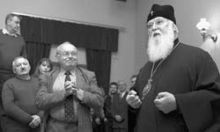Myroslav Skoryk’s opera Moses will premiere at the National Opera of Ukraine on January 27.
It is staged by the young director Anatoliy Solovianenko and the distinguished musician and conductor Ivan Hamkalo. The stage setting is by Maria Levytska, and the choir is conducted by Lev Venedyktov. The choreographer is Aniko Rekhviashvili. Five years ago, the Krushelnytska Opera House of Lviv first presented this work to the public. The premiere, which was meant to coincide with Pope John Paul II’s visit to Ukraine, was a notable cultural event. Moses on the Kyiv stage is the second version of this musical and philosophical creation. The libretto was written by the poet Bohdan Stelmakh and the composer Myroslav Skoryk. The opera is based on Ivan Franko’s long, same-titled poem. Last Tuesday the National Opera played host to Filaret, head of the Ukrainian Orthodox Church of the Kyiv Patriarchate, who blessed the cast and everyone who was involved with the production. At the request of maestro Hamkalo, His Holiness told those present about the biblical prophet and leader of the Jewish people, who dedicated all his energy and life to leading his people out of captivity and to the Promised Land. His Holiness drew parallels with modern realities, declaring: “Today we need our own Moses, who will free Ukraine from the shackles that have bound it for many centuries.”
“I think the opera Moses will be interesting for the Ukrainian public because we are experiencing a period of liberation from Soviet bondage,” Patriarch Filaret stressed in an interview with The Day, adding, “We are aware of the spirit of freedom living in an independent country, although there are quite a few Ukrainians who are looking back to the past, the way the Israelites looked back to Egypt during the times of Moses. While the latter missed meat and garlic, some of our fellow countrymen feel nostalgic about Soviet sausage that used to sell for 2.20 rubles [per kilo]. I believe that this opera will have an impact on our society, so we will fear no hardships, will not stop halfway, and will remember that freedom is far more precious than cheap meat, sausage, and gas.”
The opera in Lviv was blessed by John Paul II, you blessed Moses in Kyiv. So this opera was supported by different church confessions.
Filaret: Confessions are of no importance here because Moses is a biblical opera, and the Holy Bible is the same not only for Christians but also for the Jews; it unites all believers. I think this opera will occupy a worthy place in the theater’s repertoire and will remain topical for many years, until Ukraine firmly asserts itself as an independent country.
* * *
Myroslav Skoryk said that in Lviv the production involved 500 persons and that the one in Kyiv will be on an even larger scale. The choreography and setting of the stage versions are different (Lviv’s Moses was staged by the Polish director Zbigniew Chrzanowski together with the production designer team of brothers Tadej and Mychajуo Ryndzak), but the basis is the same. Skoryk will be at the conductor’s stand, but only during one act.
“I’m fond of Lviv and I remain its patriot, but the scales of the two theaters are different,” stressed Skoryk, adding, “I don’t mean to offend the Lviv cast, but the National Opera troupe’s professional level is noticeably higher. They had only one cast in Lviv and Kyiv has three, all top-notch soloists. For example, the lead part of Moses has been prepared by the company’s strongest basses, Mykola Shopsha, Bohdan Taras, and Serhiy Mahera; before long a fourth singer, Taras Shtonda, will join the team.”
“Many composers, including Orifice, Rossini, Rubenstein, and Schoenberg, addressed the Moses theme,” said the conductor, Ivan Hamkalo, adding: “Our opera house perceives Skoryk’s opera in the light of Ivan Franko’s poem. It was important for me to find a special intonation for every word, to make the opera sound topical today (The Day will carry interviews with Hamkalo and Skoryk in upcoming issues).
Mykola Shopsha (Moses) said: “This opera is a profoundly spiritual composition and one must perform it with a pure soul. Skoryk has written very interesting music. I will be singing this part for the first time and am thrilled to rub shoulders with this original composer, who is a subtle and intellectual individual, during rehearsals. As a singer I’ll remember this opera for a long time. It has infused a fresh spirit into the theater’s repertoire and revealed our company’s creative potential. I hope that from now on modern Ukrainian music will be heard on our stage. With Moses in our repertoire we will become a national theater in essence, not just in name.”







